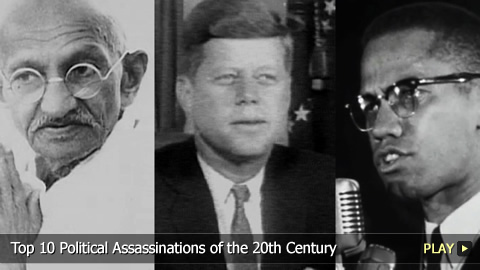Top 10 Political Assassinations of the 20th Century

#10 – Ngo Dinh Diem
As the first president of South Vietnam, Diem was steadfastly anti-Communist. This earned him United States support; however, when the U.S. discovered Diem was massacring Buddhists, he lost that support. He was captured and assassinated on November 2nd, 1963 during a coup d’état, in what proved to be a turning point of the Vietnam War.
#9 – Harvey Milk
Milk was the first openly gay elected official in California, and that’s why some consider his death a hate crime. However, Dan White apparently pulled the trigger on Milk on November 27th, 1978 because of a work dispute. Riots erupted when White was found guilty of voluntary manslaughter due to diminished capacity, and a great period of upheaval continued.
#8 – Anwar Sadat
Anwar Sadat won a Nobel Peace Prize for helping to broker the Egypt-Israel Peace Treaty, but that accord was controversial among Arab countries. During a celebration in Cairo on October 6th, 1981, Sadat was shot and killed because of it by a group that included Khalid Islambouli and some of Sadat’s own soldiers. Middle East diplomacy was never the same.
#7 – Yitzhak Rabin
Right-wing radical Yigal Amir also attempted to derail the Middle East peace process by killing one of its architects. The Israeli prime minister was killed November 4th, 1995 at a rally in Tel Aviv, after receiving heavy criticism for his support of the Oslo Peace Accords as a way to settle the Israeli-Palestinian conflict. However, Amir successfully created a “martyr for peace.”
#6 - Mahatma Gandhi
He spent his life as a symbol of peace, but on January 30th, 1948 he died as a victim of violence. After multiple assassination attempts against Gandhi, it was Hindu extremist Nathuram Godse who fired the fatal shots. Following his death, Gandhi’s teachings served as inspiration for future activists like Martin Luther King Jr. to use nonviolence as a means to an end.
#5 – Malcolm X
Malcolm X inspired many, but also made enemies with his fiery speeches and fervent beliefs. On February 21st, 1965, he was shot and killed by three different men while speaking at New York’s Audubon Ballroom. The Nation of Islam took responsibility, and Talmadge Hayer admitted his guilt, but the other two maintained their innocence. His death was one of many during the struggle for civil rights equality.
#4 – Robert Kennedy
Bobby’s death was another. While at the Ambassador Hotel in Los Angeles on June 5th, 1968 as part of his presidential campaign, Kennedy was shot by Palestinian immigrant Sirhan Sirhan due to his support of Israel. RFK’s death meant the loss of a viable candidate for the Democrats, and the eventual election of Richard Nixon in 1968.
#3 – Martin Luther King Jr.
As he spoke to a crowd in Memphis, Tennessee on April 3rd, 1968, it seemed that Dr. King knew what was coming. The next day, the civil rights leader and Nobel Peace Prize winner was shot and killed by James Earl Ray as he stood on the balcony of his hotel room. King’s death widened the gap between whites and blacks, caused riots and spurred the expansion of radical African American movements like the Black Panthers.
#2 – John Fitzgerald Kennedy
While traveling by motorcade through Dallas, Texas’ Dealey Plaza on November 22nd, 1963, he was killed by a sniper’s rifle. The repercussions of Kennedy’s assassination were felt for decades following his death: from the passage of 1964’s Civil Rights Act to the intensification of the Vietnam War, it’s impossible to know how things might have unravelled had Lee Harvey Oswald never taken the fatal shot.
#1 – Franz Ferdinand
Taking the top spot on our list is the event that sparked the First World War, and forever changed the landscape of the globe. On June 28th, 1914, Archduke Franz Ferdinand of Austria was shot and killed by Gavrilo Princip while he visited Sarajevo. The motive of Princip and his fellow Bosnian Serb revolutionaries was to break away from Austria-Hungary and form their own republic. If revolution was what they wanted, they certainly succeeded.